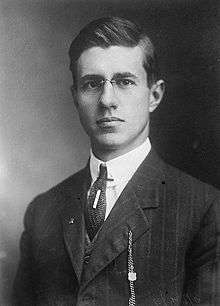Roger Sherman Hoar

Roger Sherman Hoar (April 8, 1887 – October 10, 1963) was a state senator and assistant Attorney General, for the state of Massachusetts.[1] He also wrote science fiction under the pseudonym of "Ralph Milne Farley."
Family
The Harvard-educated Hoar was the product of a New England family—the son of Sherman Hoar, grandson of former US Attorney General Ebenezer Rockwood Hoar, great-grandson of Samuel Hoar, and great-great grandson of American founding father Roger Sherman, a signer of the Declaration of Independence.
Education and career
Born in Waltham, Massachusetts, Hoar received his bachelor's degree from Harvard University in 1909 and his law degree from Harvard Law School in 1911.[2] During World War I, he served in the United States Army Coast Artillery Corps.[3] Hoar was a former Massachusetts assistant attorney general. He was a member of the Marquette University faculty in the graduate school of engineering. He also served as attorney of Bucyrus Erie Company of South Milwaukee, Wisconsin.[4]
Politician
Hoar served in the Massachusetts State Senate in 1911[5] and campaigned for women suffrage.[6] Hoar was also an organizer and major force behind the enactment of the Employee Unemployment Benefits Act, served on the Commission to Compile Information & Data, 1917, taught mathematics and engineering, patented a system for aiming large guns by the stars, and authored landmark works on constitutional and patent law.
Writer
Under the pseudonym Ralph Milne Farley, Hoar wrote a considerable amount of pulp-magazine science fiction during the period between the world wars, appearing in such publications as Argosy All-Story Weekly, Weird Tales, True Gang Life, and Amazing Stories, as well as occasional essays for The American Mercury, Scientific American, and science fiction fanzines. His works include The Radio Man and its numerous sequels, chiefly interplanetary and inner-world adventure yarns in the tradition of Edgar Rice Burroughs, with whom he was friends; Hoar also wrote a number of archetypal time-travel-paradox tales, collected in book form as The Omnibus of Time, and "The House of Ecstasy," told in the second-person and frequently reprinted since its initial appearance in Weird Tales (April 1938 issue).
Upon relocating to the Midwest, where he worked as a corporate attorney for the firm of Bucyrus-Erie, Hoar joined the Milwaukee Fictioneers, whose members included Stanley G. Weinbaum, Robert Bloch, and Raymond A. Palmer. When Chicago-based Ziff-Davis Publishing Company bought the ailing Amazing Stories in 1938, Hoar was offered, but declined, the magazine's editorship and recommended Palmer, who held the position through the 1940s.
Books
As Roger Sherman Hoar
- The Tariff Manual. Privately printed, 1912.
- Constitutional Conventions: Their Nature, Powers, and Limitations. Boston: Little, Brown, and Company, 1917.
- Patents: What a Business Executive Should Know About Patents. New York: The Ronald Press Company, 1926. Revised edition: Patent Tactics and Law. 1935, 1950.
- Conditional Sales: Law and Local Practices for Executive and Lawyer. New York: The Ronald Press Company, 1929. Revised edition: 1937.
- Unemployment Insurance in Wisconsin. karley South Milwaukee, Wisconsin: Stuart Press, 1932. Revised edition: Wisconsin Unemployment Insurance, 1934.
As Ralph Milne Farley
- Smothered Seas (story, with Stanley G. Weinbaum). Published in Astounding Stories, January 1936.
- Dangerous Love (stories) . London: Utopian Publications, 1946.
- The Immortals (novel). Toronto: Popular Publications Inc., 1947.
- The Radio Man (novel), 1924. Los Angeles: Fantasy Publishing Co., 1948. Paperback edition retitled An Earthman on Venus (Avon Books). [1st of "Radio Man" series]
- The Hidden Universe (two novellas). Los Angeles: Fantasy Publishing Co., 1950.
- The Omnibus of Time (stories). Los Angeles: Fantasy Publishing Co., 1950.
- Strange Worlds (contains The Radio Man and The Hidden Universe). Los Angeles: Fantasy Publishing Co., 1953.
- The Radio Beasts (novel), 1925. New York: Ace Books, 1964. [2nd of "Radio Man" series]
- The Radio Planet (novel), 1926. New York: Ace Books, 1964. [3rd of "Radio Man" series]
- The Radio Flyers (novel), 1929. Rialto, California: Pulpville Press, 2006.
- The Radio Gun-Runners (novel), 1930. [sequel to "The Radio Flyers"]
- Tong War (novel, written in collaboration with E. Hoffman Price). Chertsey, England: Blue Mushroom, 2002.
- Pe-Ra, Daughter of the Sun (novella). Rialto, California: Pulpville Press, 2005.
- The Radio Minds of Mars (novel), 1955. Rialto, California: Pulpville Press, 2005. [4th of "Radio Man" series]
- The Ralph Milne Farley Collection Book 1 (stories). Rialto, California: Pulpville Press, 2005.
- The Ralph Milne Farley Collection Book 2 (stories). Rialto, California: Pulpville Press, 2005.
- The Golden City (novel), 1933. Rialto, California: Pulpville Press, 2006.
- The Radio War (novel), 1932. Rialto, California: Pulpville Press, 2006.
- The Radio Menace (novel), 1930. Rialto, California: Pulpville Press, 2008. [5th of "Radio Man" series]
Notes
- ↑ Data base
- ↑ 'Harvard University Directory,' Harvard University: 1914, Biographical Sketch of Roger Sherman Hoar, pg. 386
- ↑ 'Sherman Genealogy Including Families of Essex, Suffolk and Norfolk England,' Thomas Townsend Sherman: T.A. Wright: 1920, Biographical Sketch of Roger Sherman Hoar, pg. 387
- ↑ 'Subversive Activities Against Government-Two Conflict Theories', Roger Sherman Hoar, Marquette Law Review, Vol. 27, Issue 2, February 1943, pg. 72
- ↑ 'A Manual for the use of the Massachusetts General Court 1911,' Wright and Potter Printng Company State Printers, Boston, Massachusetts: 1911, Arrangement of the Senate, pg. 431
- ↑ 'The Busiest Man of His Age In The World-Roger Sherman Hoar, Massachusetts Young Legislator Has Enough Jobs For a Dozen Men-He is an Enthusiastic Suffragist Champion and Works Hard for Interests of that Cause,' New York Times, November 20, 1910
External links
- CONSTITUTIONAL CONVENTIONS:Their Nature, Powers, and Limitations
- Hoar Family Papers, 1774-1940 (Bulk 1860-1918)
- Unemployment Insurance In Wisconsin 1932
- Ralph Milne Farley at the Internet Speculative Fiction Database
- Ralph Milne Farley at Project Gutenberg
- The Radio Beast Review
- Radio Free Venus
- Radio Pellucidar
- Sherman Genealogy Including Families of Essex, Suffolk and Norfolk, England By Thomas Townsend Sherman
- Data base at Political Graveyard